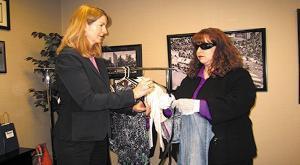

March 2016
Adina Genn
For those with compromised abilities, accomplishing even the simplest task – finding and putting on an article of clothing, perhaps, or keeping track of paperwork – can be daunting. For service providers working with impaired clients, understanding these kinds of challenges can be a revelation.
That’s why members of Cona Elder Law, an elder law firm in Melville, leapt at an opportunity to walk in their clients’ shoes. In February, the firm’s employees embarked on a “virtual dementia tour” that simulated ailments and physical limitations associated with aging.
“We think we practice law with compassion and empathy,” Jennifer Cona, Genser Dubow’s managing partner, said. “This took us to a different level. Now we really get it.”
Leading the program was Laura Giunta, the director of community outreach for Senior Helpers in Hicksville, a company that provides professionally trained caregivers that enable residents to age at home. Giunta has offered this kind of training to assisted living facilities, rehabilitation centers, home health aides, families and more.
Under Giunta’s direction, the team was outfitted with props as part of the experience. A pair of dark and cloudy eyeglasses simulated macular degeneration. Specially designed gloves enabled the attorneys to experience navigating life with arthritis. A set of headphones with surrounding noise demonstrated what the world sounds like to someone with dementia. And special footwear revealed the pain one might feel for someone with neuropathy.
Wearing the combination of props all at the same time gave the team a sense of the struggles an aging person might cope with on any given day. The attorneys were then asked to mimic everyday activities, including writing a note, putting on a sweater, folding towels, pouring water and setting a table.
“Basic tasks became really tough to do,” Cona said, adding that her feet hurt so much from the neuropathy simulator she could “hardly concentrate. It was so disorienting.”
The program helped the firm gain insights into what goes on with clients and their families, including why families frequently were delayed when it came to submitting necessary paperwork and additional information, whether for estate planning, asset protection or other legal matters.
Some clients, Cona said, “are really struggling” with steps that “we think are easy.”
She added, “Families have a lot going on, with emotional, financial and physical limitations.”
Now, Cona said, the firm is taking measures to better identify which families are coping with these kinds of ailments, and suggest where attorneys can step in, including securing signed authorizations to access pertinent information on their clients’ behalf.
That results in better serving clients, “instead of us getting frustrated,” Cona said.
That kind of frustration can be common for those working with clients coping with Alzheimer’s, dementia and more, Giunta said.
But when it comes to providing services, or accomplishing a goal, empathizing with these clients is only one part of the equation.
Giunta said verbal and visual cues could go a long way. Positioning yourself so a client can see you, making eye contact and speaking slowly help. So does providing one instruction at a time. And if, for example, you are offering food, making the eating motion at the same time helps better express that message. And always be sure that the message is grasped before moving to the next task.
And, when it comes to performing a task, a caregiver may need to say, “Let’s do it together,” Giunta noted. “Rather than two people getting frustrated, work with them where they are in their moment. It creates an atmosphere where a person feels useful, and gives them a personal sense of satisfaction, instead of a negative result escalating.”
Service providers working with clients coping with Alzheimer’s may discover useful resources at other local organizations, among them Long Island Alzheimer’s Foundation in Port Washington and the Alzheimer’s Association in Melville, said Giunta, noting she has collaborated with both groups.
Lindsay Farrell, a licensed social worker at LIAF, said service providers working with those with Alzheimer’s should “speak in a kind manner, not condescending,” keeping in mind that the person is an adult. And it helps to remain calm, even if the person says something derogatory, she added, noting, “They don’t mean it – they’re not well.”
Cona said attorneys at her firm gained a better sense of their clients’ frustrations, and those of their families.
“Now we can identify a family that can’t cope and put them on a different track,” Cona said. “We’re more hands-on, so the family literally needs to do almost nothing.”
She said the virtual dementia tour was just one of the various programs Genser Dubow strives to do in order to provide attorneys with sensitivity training. That includes providing entertainment at veterans centers, and devoting a day for crafts and games at nursing homes.
“It get us out of the office,” Cona said. “And it brings us back to who we’re working for and with.”

